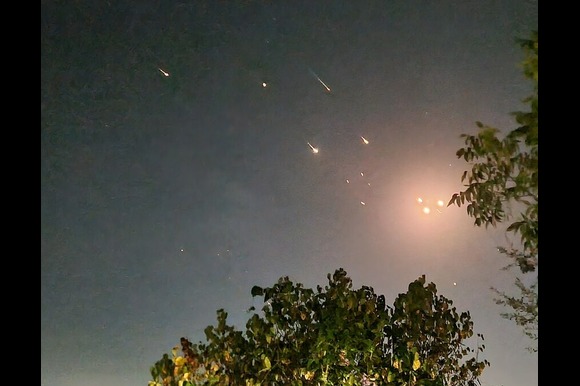Hours after Iran launched a missile strike on the largest US military base in the Middle East, former President Donald Trump extended an unexpected olive branch, thanking Tehran for providing advance notice of the attack and calling on both Iran and Israel to resume diplomatic engagement aimed at restoring regional peace.
Posting on Truth Social, Trump stated, “I am pleased to report that NO Americans were harmed, and hardly any damage was done. Most importantly, they’ve gotten it all out of their ‘system,’ and there will, hopefully, be no further HATE.” He characterized Iran’s retaliatory response—prompted by an earlier US airstrike on Iranian nuclear sites—as “very weak,” noting that 13 of the 14 missiles launched were reportedly intercepted.
While reiterating that the US had “obliterated” Iran’s nuclear facilities in a previous strike, Trump praised the absence of casualties and the prior warning from Tehran as encouraging signs. “Perhaps Iran can now proceed to Peace and Harmony in the Region, and I will enthusiastically encourage Israel to do the same,” he said.
The unusually measured tone from Trump—widely known for his incendiary rhetoric—has sparked speculation among analysts that back-channel communications between Washington and Tehran may be active. Iranian officials reportedly notified US and Qatari authorities hours before the attack, a move interpreted by many as a strategic attempt to avoid escalation while responding to domestic pressure for retaliation.
This tactic mirrors Iran’s calculated response to the 2020 US assassination of General Qasem Soleimani. At the time, Tehran also targeted a US base, causing no fatalities, and tensions gradually eased thereafter.
The recent flare-up unfolded amid increased Iranian diplomatic outreach, including high-level meetings with Russian and Chinese leaders, both of whom condemned the initial US strikes. Iranian state media described Monday’s missile launch, named ‘Operation Besharat al-Fath’ (Annunciation of Victory), as a deliberate reprisal for US actions days earlier against Iranian nuclear facilities.
According to the US Department of Defense, Iran’s missile barrage—largely directed at Al-Udeid Air Base in Qatar—was assessed as primarily symbolic. The Revolutionary Guard Corps, however, declared it a firm warning: “Iran will never leave any aggression against its territorial integrity, sovereignty, or national security unanswered.”
Two US officials confirmed that missiles were fired from Iran toward military facilities in Qatar and Iraq. Air defences at Iraq’s Ain al-Asad base were activated, but no impacts were reported there. A US military official told Reuters there was no direct hit on Al-Udeid base in Qatar.
Qatar, while condemning the attack as a “flagrant violation” of its sovereignty and airspace, confirmed that no casualties occurred. Foreign ministry spokesman Majed Al Ansari adopted a conciliatory stance, stating: “There are deep ties between the two states and the two nations, but the attack undoubtedly calls for a genuine meeting and a clear stance.”
Meanwhile, Russia strongly criticized the US and Israel over the recent escalation. During a meeting with Iranian Deputy Foreign Minister Abbas Araghchi, President Vladimir Putin labeled the strikes on Iran “unprovoked” and “unjustified,” pledging Russian support for the Iranian people.
Kremlin spokesman Dmitry Peskov added that the US airstrikes marked “a new spiral of escalation” and reiterated Moscow’s commitment to de-escalation through diplomatic efforts. On whether Russia might supply arms to Iran, Peskov said: “It depends on what Iran needs. We have offered our mediation efforts.”
China echoed Russia’s concerns. Ambassador Fu Cong, representing Beijing at the UN, accused the US of damaging its international credibility and warned of escalating risks. “Iran is harmed, but also harmed is US credibility—as a country and as a party to any international negotiations,” he said. A statement from the Chinese foreign ministry denounced the US airstrikes for violating international law and intensifying regional instability.
China also cautioned against Iran’s threats to close the Strait of Hormuz, a crucial global shipping route. Foreign ministry spokesperson Lin Jian stressed the importance of keeping the strait open for international trade and energy flow, urging restraint to avert broader economic fallout.
On the domestic front, Trump’s social media commentary hinted at support for political transformation in Iran. He posted, “If the current Iranian Regime is unable to MAKE IRAN GREAT AGAIN, why wouldn’t there be a Regime change???”
However, White House press secretary Karoline Leavitt clarified that the administration’s policy remained unchanged. “President Trump believes the Iranian people can control their own destiny,” she said.
US Secretary of State Marco Rubio, meanwhile, called on China to leverage its influence over Iran to ensure the Strait of Hormuz remains open, warning that its closure could severely disrupt global oil markets.
As the dust settles on this latest confrontation, the choreography of restrained retaliation, muted rhetoric, and behind-the-scenes communication suggests that all parties may still be seeking to avoid an all-out war.






